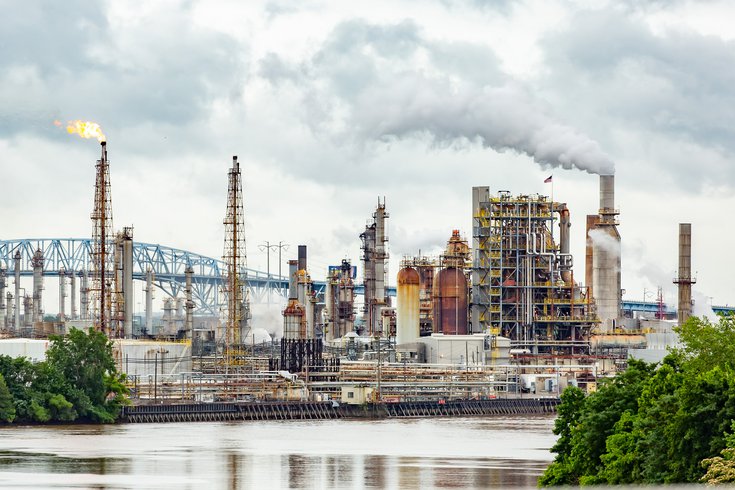
August 22, 2023
 Thom Carroll/for PhillyVoice
Thom Carroll/for PhillyVoice
Climate lawyers in Pennsylvania seek to use the state constitution to argue for tougher environmental protections. Pictured above is the former Philadelphia Energy Solutions oil refinery, which closed in 2019 after an explosion.
Last week, a court in Montana ruled that the state's energy policy, which includes several provisions to bolster and expand fossil fuel production, violated the constitutional rights of 16 young plaintiffs to a healthy environment. The case, while subject to appeal, has already been declared a groundbreaking development in climate law, one that could spark similar decisions in states across the country.
The Montana case hinged on the state's constitution, which includes an amendment, codified in 1972, instructing the state to "maintain and improve a clean and healthful environment." Hawaii adopted its amendment in 1978 and New York adopted one in 2021. Constitutional protections like these are relatively rare, though New Jersey, Maine and other states are considering adopting green amendments.
But Pennsylvania predates them all with an environmental rights amendment adopted in 1971. The state is in a better position than most to mount legal action similar that in Montana, according to Bobby McKinstry, a longtime environmental lawyer for Ballard Spahr who is now a solo practitioner.
"Pennsylvania's is actually the strongest because, in addition to the environmental rights element, it creates public trust for public natural resources for all Pennsylvanians including future generations," said McKinstry. "It makes all state and local entities trustees for those resources."
Pennsylvania's amendment declares that residents "have a right to clean air, pure water and to the preservation of the natural, scenic, historic and esthetic values of the environment" and that the state must "conserve and maintain" public natural resources. At 52, it's older than the current governor — but it lacked any real bite until the 2010s, according to John C. Dernbach, emeritus professor of law at Widener University.
Soon after the amendment was codified, he explains, the Commonwealth Court established a test that was designed to weigh environmental and developmental concerns. If a developer complied with existing laws, demonstrated a "reasonable effort" to reduce environmental impact and was shepherding a project with benefits outweighing the potential harm, they would pass the standard.
"That three-part balancing test was used as a substitute for the text of the amendment for more than four decades," Dernbach said. "And as you might guess, those invoking the environmental amendment hardly ever won."
Two cases before the Pennsylvania Supreme Court in 2013 and 2017 "breathed new life" into the amendment, Dernbach wrote, as judges struck down major pieces of an oil and gas law and tossed aside the old three-part test. But why, then, did a youth climate case, brought by the same law firm behind the Montana case, fail in Pennsylvania in 2017?
The answer is, naturally, complicated and full of legal jargon. Even at the time, the courts agreed the children at the center of the case — including three from Philadelphia with asthma — had standing. But essentially, the plaintiffs asked for too much and weren't specific enough, legal experts say.
"What courts are looking for is remedies that are judicially manageable," Dernbach said. "If there's a lawsuit and you get awarded damages, a court will basically order the defendant to pay you money. That's a pretty straightforward thing. The injunction that the plaintiffs were seeking was an injunction supervised by the Commonwealth Court that would require the state to adopt and implement laws to significantly reduce its greenhouse gas emissions. That really asks the court to do a great deal."
Another youth climate case is set for trial in Hawaii next year, but in Pennsylvania, the next climate battle to watch concerns the Regional Greenhouse Gas Initiative, Dernbach and McKinstry say. Pending litigation has blocked the state from joining the RGGI, a cooperative effort from eastern U.S. states to cap carbon dioxide emissions from the power sector. The case is pending before the Supreme Court of Pennsylvania, and in an amicus brief filed in support of the RGGI, both lawyers use the state constitution to argue for its implementation.
"Climate is not a private resource," they write in the brief. "A stable climate, not disrupted by the changes caused by human emissions of GHGs (greenhouse gas emissions), should be understood as a public natural resource to which the people have a right and which the Commonwealth has a trustee's duty to conserve and maintain."
Follow Kristin & PhillyVoice on Twitter: @kristin_hunt
| @thePhillyVoice
Like us on Facebook: PhillyVoice
Have a news tip? Let us know.